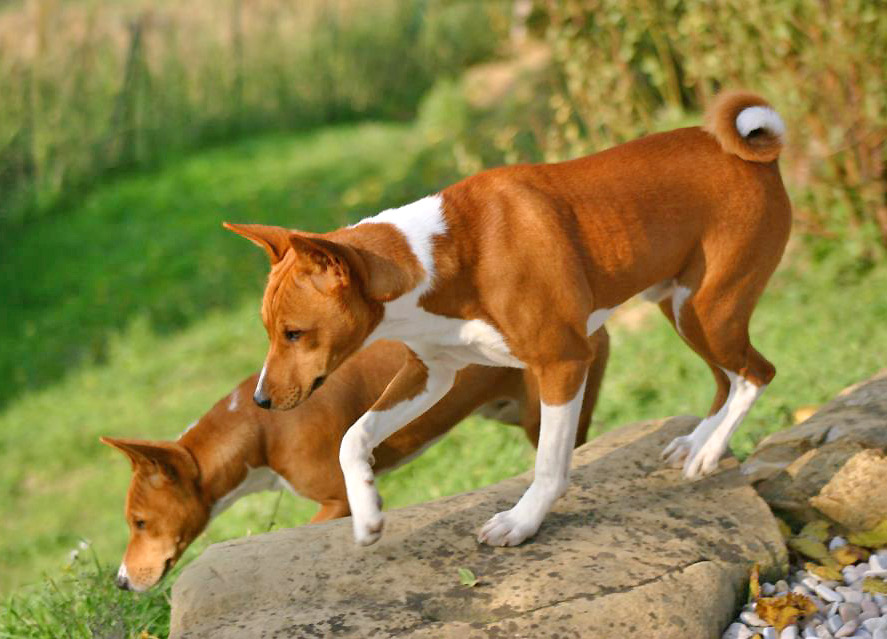The Basenji, often called “Africa’s Barkless Dog,” is one of the world’s oldest dog breeds. Rather than barking, these unique canines make distinctive vocalizations often described as a yodel or chortle, earning them the nickname “the African yodel dog.” They’re known for their elegant appearance, cat-like cleanliness, and independent nature.
Historical Background
Basenjis originated in Central Africa, particularly in the Congo region, where they were used by indigenous peoples for hunting small game and alerting to dangerous animals. Ancient Egyptian artifacts depict dogs remarkably similar to modern Basenjis, suggesting the breed’s existence as far back as 4000 BCE. The breed first arrived in England in 1937, though earlier attempts to bring them to Europe failed due to disease. They were officially recognized by the American Kennel Club in 1944.
Physical Characteristics and Size
These medium-sized dogs typically stand 16-17 inches tall at the shoulder for males and 15-16 inches for females. Their weight ranges from 22-24 pounds for males and 20-22 pounds for females. Basenjis possess a distinctive appearance with erect, pointed ears, a tightly curled tail, and a wrinkled forehead that gives them an alert, inquisitive expression. Their bodies are athletic and well-muscled, built for speed and agility.
Personality and Temperament
Basenjis exhibit a unique personality that combines intelligence with independence. They’re often described as cat-like in their behaviors, showing fastidiousness about cleanliness and a tendency toward self-grooming. While affectionate with their families, they maintain a certain aloofness and can be stubborn. Their high intelligence requires mental stimulation to prevent boredom, which can lead to destructive behavior. These dogs possess strong hunting instincts and will chase small animals, requiring secure fencing and careful supervision during walks.
Health Considerations
Like many purebred dogs, Basenjis are prone to certain genetic health issues. The most significant include Fanconi Syndrome (a kidney disorder), progressive retinal atrophy (PRA), and hypothyroidism. They may also experience hereditary eye problems and hip dysplasia. Their average lifespan is 12-16 years. Responsible breeders screen their breeding stock for these conditions to minimize health issues in offspring.
Care and Exercise Requirements
These energetic dogs require regular exercise to maintain their physical and mental well-being. A combination of daily walks and opportunities for running in a securely fenced area is ideal. Their intelligence demands mental stimulation through training, puzzle toys, and interactive play. However, traditional obedience training methods may need modification due to their independent nature. Positive reinforcement techniques work best with this breed.
Feeding and Nutrition
Basenjis thrive on high-quality dog food appropriate for their age, size, and activity level. Adult Basenjis typically require 1-1.5 cups of dry food daily, divided into two meals. Some may have sensitive digestive systems, so consistent feeding schedules and gradual food changes are recommended. Clean, fresh water should always be available.
Coat Colors and Grooming
The Basenji’s short, fine coat comes in several recognized colors: chestnut red, black, tricolor (black and chestnut), and brindle, all with white feet, chest, and tail tip. Their grooming needs are minimal due to their self-cleaning nature. Weekly brushing removes loose hair and distributes skin oils. They shed minimally and are often considered hypoallergenic, though no dog is completely allergen-free.
Interaction with Children and Other Pets
While Basenjis can be good family dogs, they’re best suited to homes with older children who understand how to interact respectfully with dogs. Their hunting instincts make them potentially unsuitable for homes with small pets like cats, rabbits, or birds. Early socialization is crucial for developing positive relationships with other dogs and accepting new situations.
Rescue and Breeding Organizations
The Basenji Club of America (BCOA) serves as the primary breed organization in the United States, maintaining breed standards and supporting rescue efforts. Regional Basenji rescue organizations operate throughout the country, helping rehome Basenjis in need. For those interested in purchasing a puppy, the BCOA provides resources for finding reputable breeders who perform appropriate health testing and follow ethical breeding practices.
Considerations Before Adoption
Potential Basenji owners should carefully consider their lifestyle and expectations. These dogs require consistent training, secure fencing, and owners who understand and appreciate their unique characteristics. While their minimal grooming needs and lack of barking might seem appealing, their high exercise requirements and independent nature can make them challenging for first-time dog owners.
This comprehensive understanding of the Basenji breed helps potential owners make informed decisions about whether this ancient, fascinating breed might be right for their household. Their unique combination of independence, intelligence, and primitive instincts creates a distinctive pet that can be both rewarding and challenging to own.
